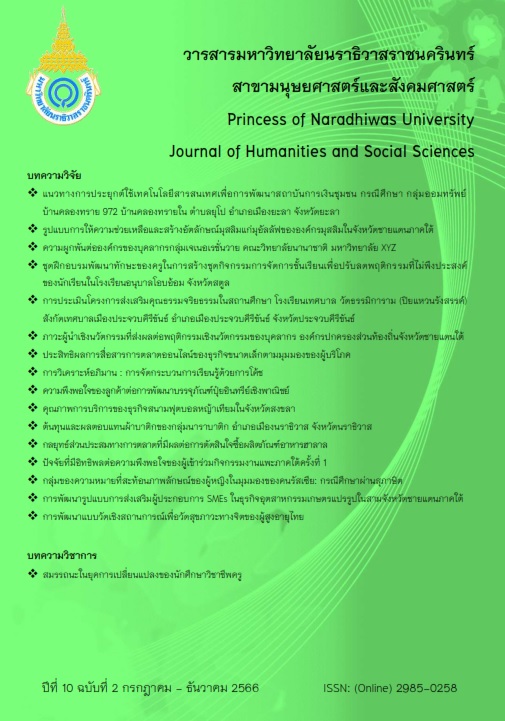ความผูกพันต่อองค์กรของบุคลากรกลุ่มเจเนอเรชั่นวาย คณะวิทยาลัยนานาชาติ มหาวิทยาลัย XYZ
Main Article Content
บทคัดย่อ
การวิจัยครั้งนี้มีวัตถุประสงค์เพื่อ 1) ศึกษาระดับความผูกพันต่อองค์กรของบุคลากร กลุ่มเจเนอเรชั่นวาย คณะวิทยาลัยนานาชาติ มหาวิทยาลัย XYZ และ 2) ศึกษาปัจจัยที่มีอิทธิพล ต่อความผูกพันต่อองค์กรของบุคลากรกลุ่มเจเนอเรชั่นวาย คณะวิทยาลัยนานาชาติ มหาวิทยาลัย XYZ โดยเป็นการวิจัยเชิงปริมาณ ประชากรกลุ่มที่ใช้ในการศึกษาครั้งนี้ คือ กลุ่มบุคลากรเจเนอเรชั่นวาย ในคณะวิทยาลัยนานาชาติ จำนวน 52 คน โดยใช้วิธีการส่งแบบสอบถามออนไลน์ด้วย Google form และมีผู้ตอบกลับมาเป็นจำนวน 50 คน คิดเป็นร้อยละ 96.15 ของบุคลากรทั้งหมด การวิเคราะห์ ใช้สถิติเชิงพรรณนา ได้แก่ ค่าเฉลี่ย ส่วนเบี่ยงเบนมาตรฐาน และการวิเคราะห์ความถดถอยเชิงพหุคูณ เพื่อหาปัจจัยที่มีอิทธิพลต่อความผูกพันต่อองค์กร ผลการศึกษาพบว่า ระดับความผูกพันต่อองค์กร ของบุคลากรกลุ่มเจเนอเรชั่นวาย คณะวิทยาลัยนานาชาติ มหาวิทยาลัย XYZ อยู่ในระดับมาก ค่าเฉลี่ยอยู่ที่ 3.69 และปัจจัยที่อิทธิพลต่อความผูกพันต่อองค์กร มี 3 ปัจจัย ได้แก่ ปัจจัยด้านบุคคลและสังคม ปัจจัยด้านสภาพแวดล้อมขององค์กร และปัจจัยด้านระบบในองค์กร อย่างมีนัยสำคัญทางสถิติที่ .05 ตามลำดับ ส่วนปัจจัยด้านลักษณะงานไม่มีผลต่อความผูกพันต่อองค์กรของบุคลากรกลุ่มเจเนอเรชั่นวาย คณะวิทยาลัยนานาชาติ มหาวิทยาลัย XYZ ข้อเสนอแนะสำหรับแนวทางการสร้างและส่งเสริม ความผูกพันต่อองค์กรให้กลุ่มบุคลากรกลุ่มเจเนอเรชั่นวายในคณะวิทยาลัยนานาชาติ ได้แก่ ปรับรูปแบบการสื่อสารภายใน พัฒนาบทบาทภาวะผู้นำ สร้างความสัมพันธ์ระหว่างผู้บังคับบัญชาและบุคลากร การสร้างบรรยากาศที่ดีภายในองค์กร สนับสนุนระบบและเทคโนโลยีให้สอดคล้องกับการทำงานส่งเสริมอบรมพัฒนาทักษะ สร้างระบบการประเมินผลงานให้มีมาตรฐาน และพัฒนาด้านการวางแผนความก้าวหน้าและการเติบโตในสายงานให้แก่บุคลากร
Article Details

อนุญาตภายใต้เงื่อนไข Creative Commons Attribution-NonCommercial-NoDerivatives 4.0 International License.
เอกสารอ้างอิง
กรุงเทพธุรกิจ. (2565). “3 เจเนอเรชั่น Gen X, Gen Y และ Gen Z สไตล์การทำงานไม่เหมือนกันองค์กรต้องเข้าใจ!”. สืบค้นจาก https://ww w.bangkokbiznews.com/health/labour/1035959
ชัชวาล ดวงบุบผา. (2563). บุพปัจจัยเชิงสาเหตุที่ส่งผลต่อความผูกพันต่อองค์กรของพนักงาน เจนเนอเรชั่นวาย ของธนาคารออมสิน. วารสารสังคมศาสตร์และมานุษยวิทยาเชิงพุทธ, 5(6), 421-441.
ณพัชญ์ปภา สว่างนุวัตรกุล. (2562). ความผูกพันต่อองค์การจากมุมมองบุคลากรทางการศึกษา เจเนอเรชั่นวาย. Chophayom Journal. 30(2), 109-118.
ทิพานัน ชัยวนนท์. (2562). ปัจจัยที่มีอิทธิพลต่อความผูกพันองค์กรของเภสัชกรเจเนอเรชั่นวายที่ปฏิบัติงานในโรงพยาบาลเขตกรุงเทพมหานคร (สารนิพนธ์ปริญญามหาบัณฑิต). มหาวิทยาลัยมหิดล, กรุงเทพฯ.
ธัญกิตติ์ จันทรัศมี. (2557). ปัจจัยที่มีผลต่อความผูกพันต่อองค์กรของพนักงานกลุ่มเจเนอเรชั่นวาย: กรณีศึกษาพนักงานภายใต้ธุรกิจค้าผลิตภัณฑ์อาหารในประเทศ บริษัท ซีพีเอฟ เทรดดิ้ง จำกัด (วิทยานิพนธ์ปริญญามหาบัณฑิต). มหาวิทยาลัยเนชั่น, ลำปาง.
นฤมล จิตรเอื้อ (2561). ความผูกพันต่อองค์กรของพนักงานเจเนอเรชั่นวายบริษัทเอกชนในธุรกิจการบริการแห่งหนึ่งในเขตกรุงเทพมหานคร”. วารสารมนุษยศาสตร์และสังคมศาสตร์. 24(พิเศษ), 53-65.
ประชาชาติธุรกิจ. (2564). “โควิด-19 เปลี่ยนโลก “ธุรกิจ” ปรับรอบทิศรับโจทย์ใหม่”. สืบค้นจาก https://www.prachachat.net/economy/news-584527.
พัชรา โพธิ์ไพฑูรย์, มนทิรา เวชมงคลกร และอนันต์ชัย คงจันทร์. (2559). ความสอดคล้องระหว่างบุคคลกับองค์กรในเรื่องค่านิยมในการทำงานที่มีผลต่อทัศนคติในการทำงานของเจนเนอเรชั่นต่าง ๆ ในองค์กร. จุฬาลงกรณ์ธุรกิจปริทัศน์, 38(1), 107-137.
พิมพ์พิสุทธ์ ตั้งฤกษ์วรากุล. (2560). ปัจจัยที่มีอิทธิพลต่อความผูกพันและความทุ่มเทของพนักงานธนาคารกลุ่มเจเนอเรชั่นวาย (สารนิพนธ์ปริญญามหาบัณฑิต). มหาวิทยาลัยมหิดล, กรุงเทพฯ.
เรือนขวัญ อยู่สบาย และกีรติกร บุญส่ง. (2560). การศึกษาเปรียบเทียบระดับความผูกพันของพนักงานตามเกณฑ์ช่วงอายุ กรณีศึกษา กลุ่มบริษัทธุรกิจเฟอร์นิเจอร์ ABC. วารสารปัญญาภิวัฒน์. 9(1), 121-134.
สุกัญญา ดีทอง. (2564). ตัวแปรที่ส่งผลต่อความสุขในการทำงานของกลุ่มคน Gen Y. วารสารวิชาการสถาบันพัฒนาพระวิทยากร, 3(2), 71-80.
สุพชร ไตรวิจิตรศิลป์. (2560) ปัจจัยที่มีอิทธิพลต่อความผูกพันต่อองค์กรของพนักงานต่อองค์กรกรณีศึกษา พนักงานเจเนอเรชั่นวาย ในองค์กรเอกชน เขตสาทรและอโศก. วารสารวิชาการมหาวิทยาลัยอีสเทริ์นเอเชีย ฉบับสังคมศาสตร์และมนุษยศาสตร์, 6(2), 260-266.
อรนันท์ กลันทะปุระ และวัชนพงษ์ หิรัณยะวสิต. (2563). ความพึงพอใจและความผูกพันต่อองค์กร ของบุคลากรงานสนับสนุนวิชาการกลุ่มบริการและสนับสนุนการบริหาร มหาวิทยาลัยธรรมศาสตร์. รัฐศาสตร์ปริทรรศน์, 7(2), 119-135.
Dharma, N. (2010). Gen B, gen X, gen Y: The power of generation. Retrieved from http://guru-marketing-Thailand.blogspot.com/2009/05gen-b-genx-gen-y-power-of-generation.html
Dimock, M. (2019). “Defining Generations: Where Millennials end and Generation Z begins”. Retrie ed from https://www.pewresearch.org/fact-tank/2019/01/17/where-millennials-end-and-generation-z-begins/
Hay Group. (2011). Engage Employees and Boost Performance. Retrieved from https://atrium.haygroup.com
Hewitt Associates. (2004). Employee engagement higher at double digit growth companies. Research Brief. Hewitt associates LLC.
International Survey Research [ISR]. (2004). Engagement. Retrieved from https://www.isrsurveys.com
Krejcie, R. V., & Morgan, D. W. (1970). Determining sample size for research activities. Educational and psychological measurement, 30(3), 607-610.
Liu, Z. A. (2016). Study on the development of structure model of engagement for knowledge employee. Business Management, 11, 65-69. http://dx.doi.org/10.13395/j.cnki.issn.1009 0061.2016.11.018
Magid Associates. (2012). “The First Generation of the Twenty First Century an Introduction to The Pluralist Generation”. New York: Maggid Generation Strategies.
People Matter. (2020). “The Emergence of Gen-R a.k.a Gen-Recalibrate”. Retrieved from https://www.peoplematters.in/blog/skilling/the-emergence-of-gen-r-aka-gen-recalibrate-25664?media_type=blog&subcat=training&title=the-emergence-of-gen-r-aka-gen-recalibrate &id=25664
Singh, P. (2017). Managing and Mentoring the Millennials. Human Capital, 21, 45-47.
Solomon. (2009). Consumer Behavior: Buying, having and being. Boston: Pearson.
Willis Towers Watson. (2017). Q3 2017 Salary Budget Planning Report. Retrieved from https://www.willistowerswatson.com/en/press/2017/11/salaries-in-thailand-seen-to-rise-5 -point-5percentin-2018
Zemka R., Raines, C. & Filipczak, B. (1999). Generation Gaps in the Classroom. Training, 36(11). 48.
Zigarmi, D., Houson, D., Witt, D., & Diehl, J. (2011). Employee Work Passion. The Ken Blanchard Companies.


